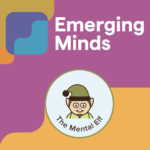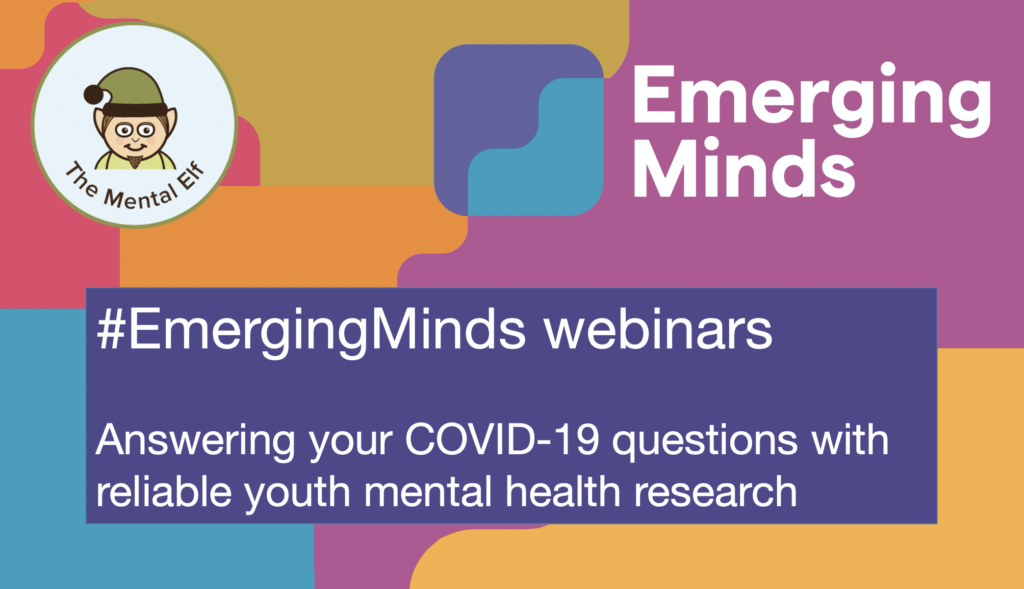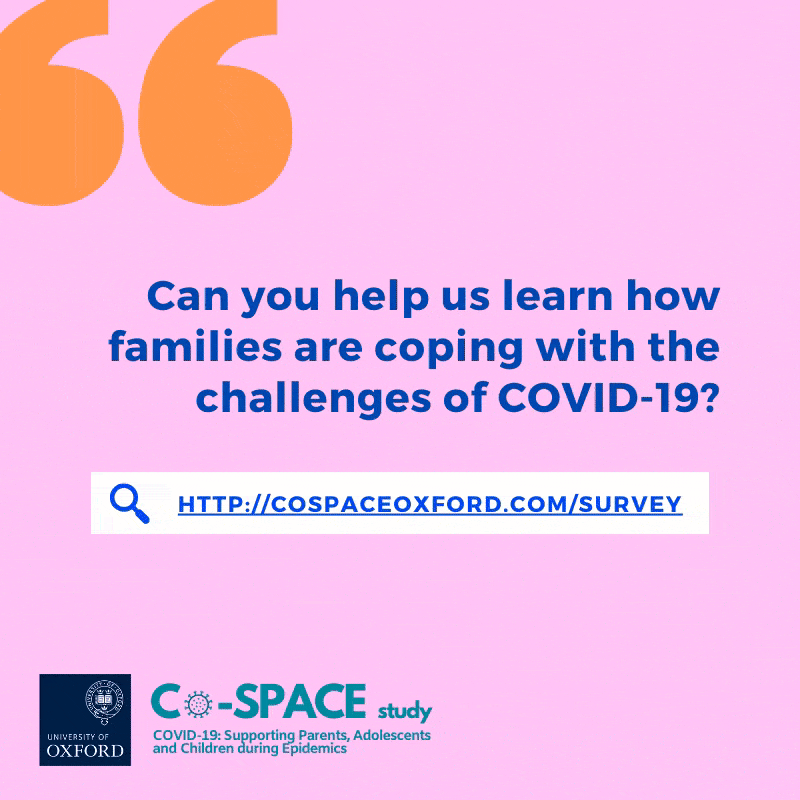
We have something a bit different today, not the usual blog about a new piece of research, but a summary of a series of online events that I have just finished running in partnership with the Emerging Minds Mental Health Research Network.
So if you want to find out more about supporting the mental health and wellbeing of children and young people through the pandemic and into the future, you could do a whole lot worse can watching some of the talks I’ve collected below.
These #EmergingMinds webinars began when the coronavirus lockdown came into place in England, and were run at a rate of about one a week. There were eight in total and each one brought together experts in the field (clinicians, researchers and charity leads) who shared their knowledge and experience with a webinar audience of a few hundred people.
We were keen to make the events as user-friendly, relevant and reliable as possible. Our over-arching aim was to focus on topics that matter now during the pandemic, and answer questions by summarising the best available evidence in a way that made sense not just to professionals, but also to parents and carers currently living with and/or caring for children and young people.
I’m really proud of what we achieved with this series of free online events and want to use this blog to bring all of the amazing expert talks together in one place for you lovely Mental Elf readers. I hope you find them informative and useful.

The #EmergingMinds webinars answered questions by summarising the best available evidence in a way that made sense not just to professionals, but also to parents and carers currently living with and/or caring for children and young people during the pandemic.
Worries and anxiety
The first webinar took place on 24th March and the talks by Polly Waite, Cathy Creswell and Helen Dodd were aimed at parents, carers and anyone supporting families during COVID-19. The team also produced a really nice leaflet: Top tips to support children and young people with their worries and anxiety, which is available in many different languages.
Polly Waite – Managing children and young people’s anxiety, fears and worries
Cathy Creswell – Parent responses to children’s worries and fears
Helen Dodd – Play and emotional wellbeing in children and young people
Screen-time
Our second webinar on 17th April tackled a topic that was on the minds of many parents and carers at the beginning of lockdown: teens, screens and quarantines! We asked Pete Etchells and Amy Orben to talk about gaming, social media use and screen-time in young people, and they delivered a brilliant session aimed at parents, carers and those supporting children, young people and families.
Pete Etchells – Screen-time and gaming
Pete’s top tips about screen-time during lockdown were:
- Consider context and content: what are screens being used for and who with? (home & online). Screen-time can mean solitary activities, but it can also be a very sociable thing
- Avoiding too much sedentary behaviour (including passive versus active screen time)
- Flexibility, curiosity and conversations are key.
Read all my tweets about @PeteEtchells’ talk here
Amy Orben – Screen-time and social media
Amy told us that digital technology and social media have received a lot of very negative press over recent years, but it’s important that we put things into perspective and focus on what we actually know from reliable research. Research shows a small negative link between social media use and psychological wellbeing in young people, but the direction of this relationship is unclear, i.e. does social media use cause mental health problems or vice versa?
Read all my tweets about @OrbenAmy’s talk here
Social isolation
Our third webinar on 21st April summarised what research can tell us about the impact that social isolation can have on the mental health of young people. The talks from Maria Loades and Shirley Reynolds presented the findings of their recent rapid review and suggested what parents, carers and professionals can do to support children and adolescents through the difficult lockdown situation.
Maria Loades – Living through lockdown
Maria said that children asking: “why don’t I have friends anymore?” should be given a clear explanation about why they aren’t seeing their friends, regular reminders of friends (e.g. virtual playdates), and continued building of social skills. She recommended that teenagers asking: “who am I without my friends?” should be encouraged to keep connections with social networks, find ways to interact that mirror ‘usual’ interactions, but she also offered a note of caution about some social media, especially open, unmoderated forums.
Read all my tweets about @MariaLoades’ talk here
Shirley Reynolds – Living through lockdown
Shirley spoke about the pillars of wellbeing (sleep, diet, activity and purpose; all built on relationships), the importance of rewards (especially social rewards) for young people, and what parents and carers can do to help their children through the social isolation of lockdown.
Read all my tweets about @DrS_Reynolds’ talk here
Autism
Our fourth webinar on 23rd April featured Jonathan Green and James Cusack who told us how to support children and young people with Autistic Spectrum Disorder at this time. This webinar was particularly for parents, carers and those supporting children, young people and families.
James Cusack – COVID-19 and autism
James had lots of advice for helping autistic people during the pandemic:
- Try to prevent uncertainty: Minimise info gathering/checking/ruminating, avoid situations completely or make decisions quickly to resolve things
- Try to: build in time for relaxation, mindfulness, activities & structure to keep mind off things, worry box and a specific times to share worries, supporting your child to control what they can
- Routine is important: home is not school, consistent wake up time, clear expectations, create schedule together, offer limited choices, accept and understand protests, exercise is important
Read all my tweets about @JamCusack’s talk here
Jonathan Green – Supporting autistic children and young people during COVID-19
Jonathan reminded us that the disruption of concrete routines and predictability can be deeply disorientating for autistic children. He spoke about the importance of providing new understandings to hold onto during the pandemic, which could be developed through narratives and social stories, and better understood through action and play.
Read all my tweets about Jonathan Green’s talk here
Self-harm
Our fifth webinar on 12th May focused on managing self-harm in lockdown. Ann John and Faraz Mughal shared a summary of the research and provided lots of useful advice for parents, carers and others who support families.
Ann John – Managing self-harm during lockdown
Ann spoke about how we can support young people who self-harm during lockdown. She focused on what self-harm is, why young people do it, what the common risk factors are, and what parents, carers and others can do to help.
Read all my tweets about @ProfAnnJohn’s talk here
Faraz Mughal – GP perspective on self-harm
Faraz gave the GP perspective on self-harm in young people and provided lots of useful advice to other primary care professionals on how to support young people who self-harm.
Read all my tweets about @farazhmughal’s talk here
School
Our sixth webinar on 22nd May drew the biggest crowd as we provided support and advice for teachers and other educators getting ready to re-open their doors to large numbers of students. Tamsin Ford, Polly Waite and Fran Morgan summarised the evidence about how best to support the mental health of children and young people heading back to school.
Tamsin Ford – Supporting children’s mental health as schools re-open
Tamsin provided a really useful overview of the factors that can influence mental health in young people, and explained that schools and school staff have a direct role in some of them, but can also identify and influence many others. She stressed that as we prepare to open schools once again to many more students, we should pay special attention to young people with existing mental health problems, special educational needs, or those with adverse experiences.
Read all my tweets about @Tamsin_J_Ford’s talk here
Polly Waite – Supporting children and young people around attending school during the COVID-19 pandemic
Polly gave some great practical suggestions about supporting children with anxiety-based school attendance difficulties, which included: facing and testing out fears, social skills training, taking action rather than dwelling on problems, and problem-solving real life worries.
Read all my tweets about @PollyWaite’s talk here
Fran Morgan – Not fine in school
Fran spoke about school attendance difficulties (school refusal) and highlighted her work with the Square Peg and Not Fine In School initiatives.
Read all my tweets about @teamsquarepeg’s talk here
Sleep
Our seventh webinar on 27th May focused on sleep and how sleeping patterns may have been affected during the pandemic lockdown. Our speakers Cathy Creswell, Faith Orchard and Dimitri Gavriloff summarised the research evidence and provided some very useful practical tips on improving sleep in young people.
Cathy Creswell – Emerging Minds and the Co-Space study
Cathy began by presenting some brand new data from the Co-Space study (Supporting Parents, Adolescents and Children during Epidemics).
Read all my tweets about @CathyCreswell’s talk here
Faith Orchard – Teen sleep during COVID-19
Faith spoke about the common sleep problems that can occur during adolescence and focused on the impact that the pandemic may be having on sleep in young people.
Read all my tweets about @FaithOrchard’s talk here
Dimitri Gavriloff – Healthy sleep habits in teenagers during COVID-19
Dimitri provided a wealth of useful tips and advice for young people struggling with sleep difficulties during the lockdown, including a great downloadable guide to protecting your sleep during the COVID-19 pandemic (PDF).
Read all my tweets about @DrDGavriloff’s talk here
Play
Our eighth and final webinar on 28th May was a real tour de force from Wendy Russell and Helen Dodd who spoke about the vital role that play has in the mental health and wellbeing of children. They stressed that whilst infection control and educational targets are important right now, we also need to make sure we put #PlayFirst for children and young people.
Wendy Russell – Playing around with emotions
Wendy explained that playing (especially with friends) is crucial for children’s health and well-being, and the feelings children have when they play help them cope with stress and uncertainty. She gave a timely reminder during the pandemic that adults should pay attention to the conditions that support children’s play: time, space and permission.
Read all my tweets about @wkrussell’s talk here
Helen Dodd – Let us play: children’s mental health during COVID-19
Helen stressed that play can help children to cope during social isolation and whilst transitioning out of lockdown. She presented research findings that show how play can reduce children’s stress, and also highlighted that play outdoors and play in nature have added benefits for children’s emotional wellbeing.
Read all my tweets about @DrHelenDodd’s talk here
“Are you organising any more webinars?”
We would love to run more #EmergingMinds webinars in future, as they have been well attended and really well received by parents, carers and a wide range of professionals. It takes quite a bit of time and effort to organise these online events, so we are currently looking for funding to support this work in the future. If you are a funder or philanthropist who would like to see youth mental health research brilliantly disseminated to the masses, do get in touch!
Help with your events
Here at The Mental Elf we are hosting many online mental health events with academics, charities, public sector organisations and companies. If you are planning an event and need help reaching a wider audience and having a bigger impact, do drop us a line and tell us about it.
Get involved in our ongoing research
The Co-Space study (Supporting Parents, Adolescents and Children during Epidemics) will tell us how families are coping during the COVID-19 (coronavirus) pandemic, and what parents can do to help support their children’s mental health.
Your responses will help us to find out how children, young people and their families are getting on, what is working for them, and what they are finding difficult so that we can understand how best to help.
Read the latest Co-Space study news and sign up now.

Help us find out what parents can do to help support their children’s mental health during the pandemic.
